Faculty Publications
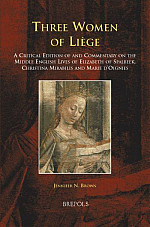
Elizabeth of Spalbeck, Christina Mirabilis, and Marie d’Oignies were three of the famous late twelfth-/early thirteenth-century holy women from the region of Brabant and Liege: their life stories (written in Latin by Philip of Clairvaux, Thomas of Cantimpre, and Jacques of Vitry) were read throughout later medieval Europe, and Margery Kempe modelled her book, and her life, upon Marie’s. The Latin lives of these beguine saints were not well known in England, but they were translated into English in the fifteenth century and survive together in a single manuscript: Oxford, Bodleian Library, Douce 114. Three Women of Liege is the first critical edition of these Lives, which represent some of the only evidence of English interest in continental female mysticism. This edition includes an introduction that discusses the role of the manuscript in England and three essays that analyze the roles of these beguines in their Low Countries home of Liege along with the English reception of their lives. The edition itself is also extensively annotated and glossed, making it accessible to any scholar of English medieval literature.
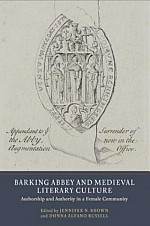
Barking Abbey (founded c. 666) is hugely significant for those studying the literary production by and patronage of medieval women. The Abbey had one of the largest libraries of any English nunnery, which included a history of women’s education from the Anglo-Saxon period to the Dissolution; it was also the home of women writers of Latin and Anglo-Norman works, as well as many Middle English manuscript books. The essays in this volume map its literary history, offering a wide-ranging examination of its liturgical, historio-hagiographical, devotional, doctrinal, and administrative texts, with a particular focus on the important hagiographies produced there during the 12th century. It thus makes a major contribution to the literary and cultural history of medieval England and a rich resource for the teaching of women’s texts.
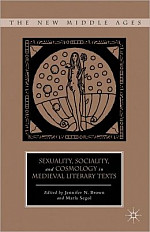
For many medieval authors, sexuality was the ultimate expression of embodiment. Sexuality could be a medium for human communication with the divine, but it could also be a barrier when not conceptualized or practiced correctly. Broad in scope, this collection shows several operating models of body and cosmos. Exploring the relation between sexuality and cosmology in a variety of literary texts from the tenth to the sixteenth centuries, the essays reveal that medieval authors, whether lay or religious, Christian or Jewish, were grappling with the same sets of questions about sexuality as people are today.

This book exposes how Fado lyricists have appropriated popular novelist and playwright Júlio Dantas’s forging of Mouraria fadista/ prostitute Maria Severa as a national heroine, and the Fado as the national song—in A Severa (1901) and A Severa: Peça em Quatro Actos (1901)—to manifest a sub-rosa criticism of the Estado Novo’s demolition of the Mouraria neighborhood between the 1930s and 1970s. The lyricists exploit Dantas’s fictionalization/dramatization of Severa’s life, death, and consequent legacy in its attempt to link Severa’s Mouraria and the Fado to the Portuguese character, to evoke national sympathy, or even outrage, for the local cause of the erasing of the Mouraria. In the Fado’s recontextualization of Dantas’s Mouraria, we observe a criticism of the imminent destruction of the neighborhood’s three faces: the fadista, the artistocratic, and the Christian. The lyrics of the Fado of the 1930s to 1970s lament the demolitions that have taken place and warn against further erasing Dantas’s Mouraria.
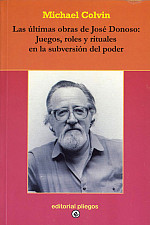
Este libro estudia una constante de la novelística donosiana: la sublevación del poder en la convivencia humana mediante actos inocentes. Colvin aprovecha las últimas cinco novelas de José Donoso para contextualizar una análisis de actos carnavalescos, y hasta caprichosos, que aparentan trastrocar el orden del régimen dominante. Mas tales inversiones siempre resultan efímeras, y acaban remitiéndose a la estructura opresiva anterior. Estas obras del ocaso de la carrera literaria de Donoso complementan su narrativa previa en su problematización de la relación siervo/ patron, roles intercambiables y en constante fluctuación. Donoso reitera vigorosamente el tema de la lucha perpetua del poder inherente en cualquier conflicto social; pero siempre visto desde una perpectiva nueva y en permanente cambio.
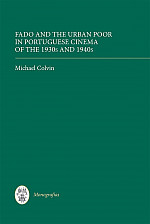
Colvin studies the evolution of Fado music as the soundtrack to the Portuguese talkie. He analyzes the most successful Portuguese films of the first two decades of the Estado Novo era, showing how directors used the national song to promote the values of the young Regime regarding the poor inhabitants of Lisbon’s popular neighborhoods. He considers the aesthetic, technological, and social advances that accompany the progress of the Estado Novo—-Futurism; the development of sound film; the inception of national radio broadcast; access to the automobile; and urban renewal—-within a historical context that considers Portugal’s global profile at the time of António de Oliveira Salazar’s rise to power and the inauguration of António Ferro’s Secretariado da Propaganda Nacional; Portugal’s role as a secret ally of the Falange during the Spanish Civil War; Lisbon’s role as a neutral refuge during World War II; and the Portuguese colonial empire as an anachronism in the post-World War II years.
Colvin argues that Portuguese directors have exploited the growing popularity of the Fado and Lisbon’s fadistas to dissuade citizens from alien values that promote individual ambitions and the notion of an easy life of poverty in the capital. As the public image of the Fado evolves, the fadista’s role in film becomes more prominent and eventually the fadista is the protagonist and the Fado the principal concern of national film. The author exposes the irony that as the social profile of the Lisbon fadista improves with the international fame of singer Amália Rodrigues, Portuguese film perpetuates and validates the outdated characterization of the fadista as a social pariah that Leito de Barros proposed in the first Portuguese talkie, A Severa (1931).
___________________________________________________________________
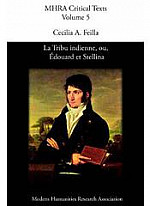
La Tribu indienne, ou, Édouard et Stellina, by Lucien Bonaparte - Cecilia Feilla, Editor
Lucien Bonaparte (1775-1840) is best known as the younger brother of Napoleon Bonaparte who played a key role in the 18th Brumaire coup d’état that brought his brother to power in 1799. He was subsequently named Minister of the Interior of the Empire, though soon fell out of favor with his brother. Lucien maintained a strong interest in the arts and, in addition to the novel La tribu indienne, he also wrote memoirs, travel journals, and an epic poem, Charlemagne, ou, L’église délivrée. La tribu indienne was published in 1799 but the author had all copies of the novel suppressed shortly after he was appointed Minister of the Interior. It reappeared in 1802 under a different title, Les Tenadores, ou, L’Europeéen et l’indienne but without illustrations and without mention of Lucien Bonaparte. In 1848 the novel was reissued under its original title with illustrations by Prudhon and went into several editions. This edition brings to light a lost text that will be of considerable interest to scholars, contributing to the recent re-evaluation of the French literary canon through consideration of key sentimental texts.
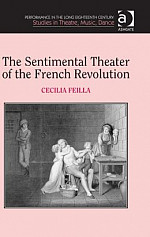
Smoothly blending performance theory, literary analysis, and historical insights, Cecilia Feilla explores the mutually dependent discourses of feeling and politics and their impact on the theatre and theatre audiences during the French Revolution. Remarkably, the most frequently performed and popular plays from 1789 to 1799 were not the political action pieces that have been the subject of much literary and historical criticism, but rather sentimental dramas and comedies, many of which originated on the stages of the Old Regime. Feilla suggests that theatre provided an important bridge from affective communities of sentimentality to active political communities of the nation, arguing that the performance of virtue on stage served to foster the passage from private emotion to public virtue and allowed groups such as women, children, and the poor who were excluded from direct political participation to imagine a new and inclusive social and political structure. Providing close readings of texts by, among others, Denis Diderot, Collot d’Herbois, and Voltaire, Feilla maps the ways in which continuities and innovations in the theatre from 1760 to 1800 set the stage for the nineteenth century. Her book revitalizes and enriches our understanding of the significance of sentimental drama, showing that it was central to the way that drama both shaped and was shaped by political culture.
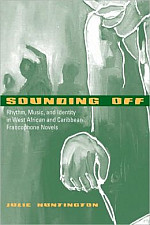
Intrigued by “texted” sonorities—the rhythms, musics, ordinary noises, and sounds of language in narratives—Julie Huntington examines the soundscapes in contemporary Francophone novels such as Ousmane Sembene’s God’s Bits of Wood (Senegal) and Patrick Chamoiseau’s Solibo Magnificent (Martinique). Through an ethno-musicological perspective, Huntington argues that the range of sounds—footsteps, heartbeats, drumbeats—represented in West African and Caribbean works provides a rhythmic polyphony that creates spaces for configuring social and cultural identities. Huntington’s analysis shows how these writers and others challenge the aesthetic and political conventions that privilege written texts over orality and invite readers/listeners to participate in critical dialogues—to sound off, as it were, in local and global communities.
___________________________________________________________________
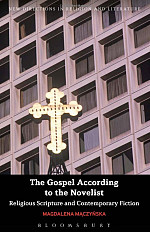
Why have so many prominent literary authors-from Philip Pullman and José Saramago to Michèle Roberts and Colm Tóibím-recently rewritten the canonical story of Jesus Christ? What does that say about our supposedly secular age? In this insightful study, Magdalena Maczynska defines and examines the genre of scriptural metafiction: novels that not only transform religious texts but also draw attention to these transformations. In addition to providing rich examples and close readings, Maczynska positions literary studies within interdisciplinary debates about religion and secularity. Her book demonstrates a surprising turn of events: even as contemporary novelists deconstruct the traditional categories of “secular” and “sacred” writing, they open up new spaces for scripture in contemporary culture.
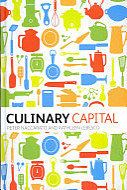
TV cookery shows hosted by celebrity chefs. Meal prep kitchens. Online grocers and restaurant review sites. Competitive eating contests, carnivals and fairs, and junk food websites and blogs. What do all of them have in common? According to authors Kathleen LeBesco and Peter Naccarato, they each serve as productive sites for understanding the role of culinary capital in shaping individual and group identities in contemporary culture. Beyond providing sustenance, food and food practices play an important social role, offering status to individuals who conform to their culture’s culinary norms and expectations while also providing a means of resisting them. Culinary Capital analyzes this phenomenon in action across the landscape of contemporary culture. The authors examine how each of the sites listed above promises viewers and consumers status through the acquisition of culinary capital and, as they do so, intersect with a range of cultural values and ideologies, particularly those of gender and economic class.
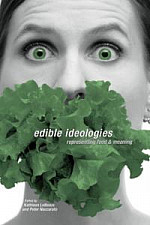
Edible Ideologies argues that representations of food—in literature and popular fiction, cookbooks and travel guides, war propaganda, women’s magazines, television and print advertisements—are not just about nourishment or pleasure. Contributors explore how these various modes of representation, reflecting prevailing attitudes and assumptions about food and food practices, function instead to circulate and transgress dominant cultural ideologies. Addressing questions concerning whose interests are served by a particular food practice or habit and what political ends are fulfilled by the historical changes that lead from one practice to another in Western culture, the essays offer a rich historical narrative that moves from the construction of the nineteenth-century English gentleman to the creation of two of today’s iconic figures in food culture, Julia Child and Martha Stewart. Along the way, readers will encounter World War I propaganda, holocaust and Sephardic cookbooks, the Rosenbergs, German tour guides, fast food advertising, food packaging, and chocolate, and will find food for thought on the meaning of everything from camembert to Velveeta, from salads to burgers, and from tikka masala to Campbell’s soup.
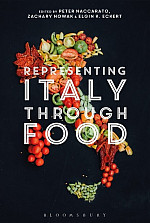
Representing Italy through Food is the first book to examine how these perceptions are constructed, sustained, promoted, and challenged. Recognizing the power of representations to construct reality, the book explores how Italian food and foodways are represented across the media – from literature to film and television, from cookbooks to social media, and from marketing campaigns to advertisements. Bringing together established scholars such as Massimo Montanari and Ken Albala with emerging scholars in the field, the thirteen chapters offer new perspectives on Italian food and culture. Featuring both local and global perspectives – which examine Italian food in the United States, Australia and Israel – the book reveals the power of representations across historical, geographic, socio-economic, and cultural boundaries and asks if there is anything that makes Italy unique.

In this collection of poems, Williams employs elements of both the narrative and surrealistic lyric—addressing subjects as diverse as family, alienation, political quandary, and artistic desire—in order to craft a darkly humorous and generally hard-hitting vision of the current state of contemporary America. In the words of Bob Hicok: “This is not the misanthrope’s attack but the lover’s hope for something better and true: a genuine self, a sustaining culture.”
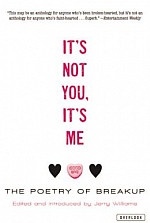
Award-winning poet Jerry Williams is an expert in breaking up, and he credits his survival to the careful words of poets who have loved and lost before him. It’s Not You, It’s Me is a poetry anthology—at once amusing, angry, sweet, and bitter—that gives a fresh voice to the all-too-familiar experience of ending a relationship. Williams compiled over ninety poems by contemporary writers including Denis Johnson and Kim Addonizio, as well as former poets laureate Robert Hass, Maxine Kumin, and Mark Strand, whose comforting and healing words dragged him out of his breakup-induced depression.

“Jerry Williams’s poems are filled with astonishing energy and brutal insights. His language burns and blisters; his images shatter. He is like a character in a Samuel Beckett novel who knows there is no way out. His isolation is absolute, yet he tries frantically to make contact with a world he can only sense is beyond himself. Beautiful, frightening poems.” (Richard Shelton)